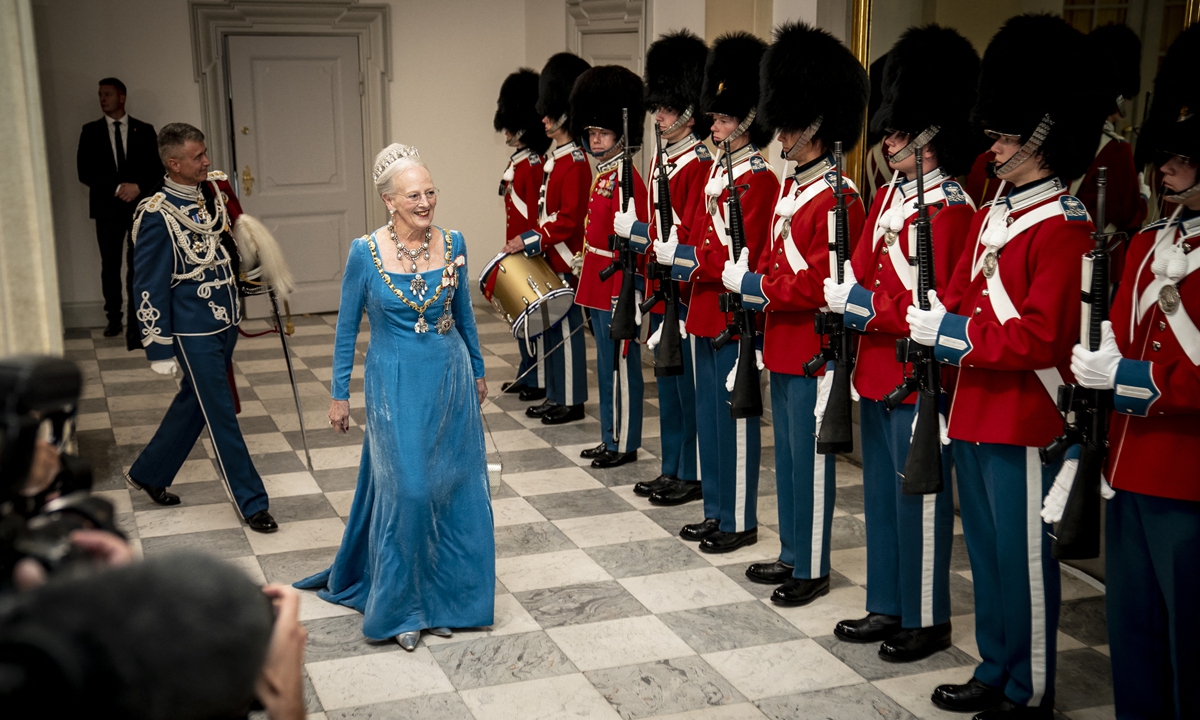
Queen Margrethe of Denmark reviews an honor guard as she arrives to the gala banquet at Christiansborg Palace in Copenhagen, Denmark on September 11, 2022. Photo: AFP
Denmark's popular Queen Margrethe II is now Europe's longest-serving monarch and also its only reigning queen after the death of Britain's Queen Elizabeth II.
The artistic and chain-smoking 82-year-old, always impeccably coiffed with her white hair swept up in a bun and hailed for unifying and modernizing the Danish monarchy in her 50 years on the throne, has scaled back golden jubilee festivities this weekend following the death on September 8 of Britain's head of state.
First woman to hold the position
Margrethe came to the throne at the age of 31 in January 1972 on the death of her father, Frederik IX, becoming the first woman to hold the position of reigning queen in Denmark.
She took her reign name Margrethe II in recognition of Margrethe I, who ruled Denmark from 1375-1412 but never formally held the title.
At the time of her accession, only 45 percent of Danes were in favor of the monarchy, most believing it had no place in a modern democracy.
During her reign, however, Margrethe has managed to stay away from scandal and helped to modernize the institution - allowing her two sons to marry commoners, for example.
Today, the Danish monarchy is one of the most popular in the world, enjoying the support of more than 80 percent of Danes.
At 50 years and seven months on the throne, she is now the longest-reigning monarch in Europe following the death of her third cousin, Queen Elizabeth II.
She is trailed by her first cousin, Carl XVI Gustaf of Sweden, who has been king for 48 years.
Margrethe is also Europe's only reigning queen, although four countries - Belgium, the Netherlands, Spain and Sweden - have crown princesses.
'Until I drop'
Margrethe was born in Copenhagen on April 16, 1940, just one week after Nazi Germany's invasion of Denmark.
She eventually became the eldest of three sisters, but when she was born Denmark's law of succession barred women from inheriting the throne.
The law was changed in 1953 following a referendum, under pressure from successive Danish governments mindful of a need to modernize society.
"She has managed to be a queen who has united the Danish nation in a time of large changes: globalization, the appearance of the multicultural state, economic crises in the 1970s, 1980s and again in 2008 to 2015, and the pandemic," historian Lars Hovebakke Sorensen told AFP.
"The basis of her popularity is that the queen is absolutely non-political," he said in a statement.
Margrethe marked the 50th anniversary of her accession in January with a scaled-down celebration due to COVID-19.
The full festivities had been postponed until this weekend but were again downsized considerably after the death of Queen Elizabeth II, with a carriage procession through the streets of Copenhagen and a balcony appearance canceled.
The queen, affectionately nicknamed "Daisy" by her family and subjects, has managed to keep the monarchy relevant without diminishing its status.
Widowed in 2018, she has repeatedly insisted that she will never step down from her duties.
"I will stay on the throne until I drop," she says.
Denmark has no tradition of abdication - and given her robust health the question has never been raised seriously.
In May, she rode a roller-coaster at Copenhagen's famed Tivoli amusement park, her hat fastened securely on her head.
Her eldest son, 54-year-old Crown Prince Frederik, is due to succeed her when the time comes.
Queen of arts
With sparkling blue eyes and a broad smile, she is known for her relaxed and playful side, as well as for her involvement in Denmark's cultural scene.
A painter as well as a costume and set designer, she has worked with the Royal Danish Ballet and Royal Danish Theatre on numerous occasions.
She has studied at Cambridge and the Sorbonne, and is a fluent speaker of English, French, German and Swedish.
She has participated in elaborate translation projects, including the 1981 Danish version of Simone de Beauvoir's All Men are Mortal under a pseudonym in cooperation with her French-born husband, Prince Henrik.
But it is primarily her paintings and drawings that have caught the public's eye.
She has illustrated several books, including a Danish 2002 edition of J.R.R. Tolkien's The Lord of the Rings, and her paintings have been exhibited in museums and galleries in Denmark and abroad.
AFP
